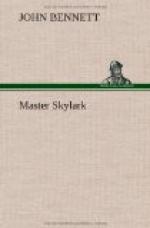She put one arm about his shoulders, brushed back his curly hair, and kissed him on the forehead.
“Thou art mine own good little son,” said she, tenderly, “and I will bake thee a cake in the new chimley on the morrow for thy May-day-feast.”
Then she helped him fetch the trestles from the buttery, set the board, spread the cloth, and lay the wooden platters, pewter cups, and old horn spoons in place. Breakfast being ready, she then called his father from the yard. Nick waited deftly upon them both, so that they were soon done with the simple meal of rye-bread, lettuce, cheese, and milk.
As he carried away the empty platters and brought water and a towel for them to wash their hands, he said quietly, although his eyes were bright and eager, “The Lord High Admiral’s company is to act a stage-play at the guildhall to-morrow before Master Davenant the Mayor and the town burgesses.”
Simon Attwood said nothing, but his brows drew down.
“They came yestreen from London town by Oxford way to play in Stratford and at Coventry, and are at the Swan Inn with Master Geoffrey Inchbold—oh, ever so many of them, in scarlet jerkins, and cloth of gold, and doublets of silk laced up like any lord! It is a very good company, they say.”
Mistress Attwood looked quickly at her husband. “What will they play?” she asked.
“I can na say surely, mother—’Tamburlane,’ perhaps, or ’The Troublesome Reign of Old King John.’ The play will be free, father—may I go, sir?”
“And lose thy time from school?”
“There is no school to-morrow, sir.”
“Then have ye naught to do, that ye waste the day in idle folly?” asked the tanner, sternly.
“I will do my work beforehand, sir,” replied Nick, quietly, though his hand trembled a little as he brushed up the crumbs.
“It is May-day, Simon,” interceded Mistress Attwood, “and a bit of pleasure will na harm the lad.”
“Pleasure?” said the tanner, sharply. “If he does na find pleasure enough in his work, his book, and his home, he shall na seek it of low rogues and strolling scape-graces.”
“But, Simon,” said Mistress Attwood, “’tis the Lord Admiral’s own company—surely they are not all graceless! And,” she continued with very quiet dignity, “since mine own cousin Anne Hathaway married Will Shakspere the play-actor, ’tis scarcely kind to call all players rogues and low.”
“No more o’ this, Margaret,” cried Attwood, flushing angrily. “Thou art ever too ready with the boy’s part against me. He shall na go—I’ll find a thing or two for him to do among the vats that will take this taste for idleness out of his mouth. He shall na go: so that be all there is on it.” Rising abruptly, he left the room.
Nick clenched his hands.
“Nicholas,” said his mother, softly.
“Yes, mother,” said he; “I know. But he should na flout thee so! And, mother, the Queen goes to the play—father himself saw her at Coventry ten years ago. Is what the Queen does idle folly?”




